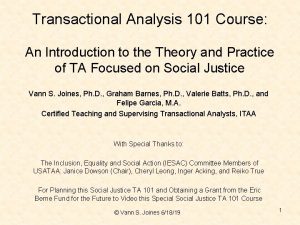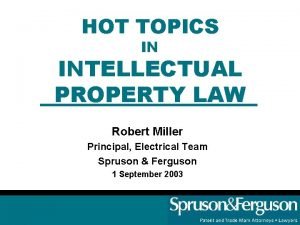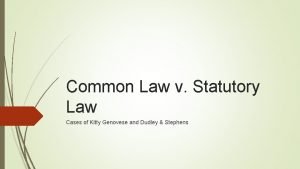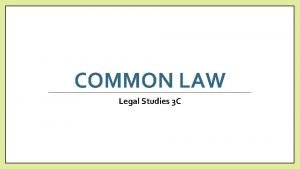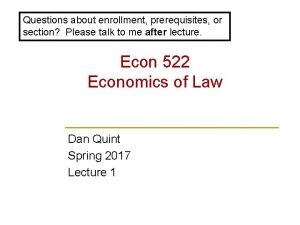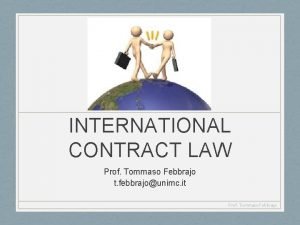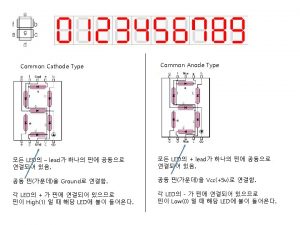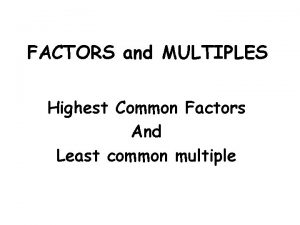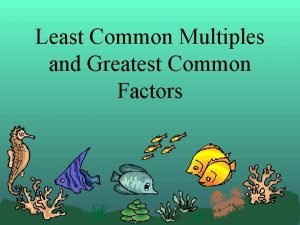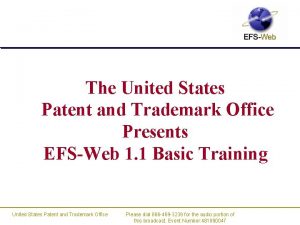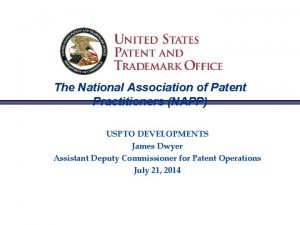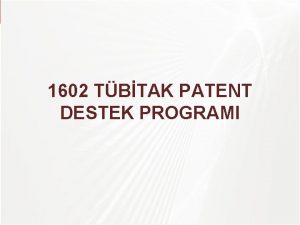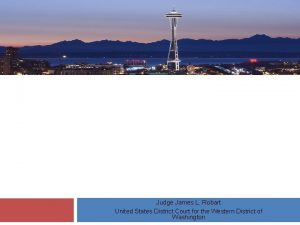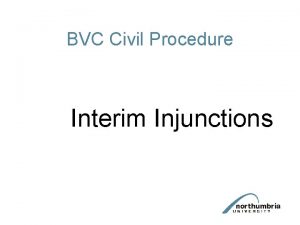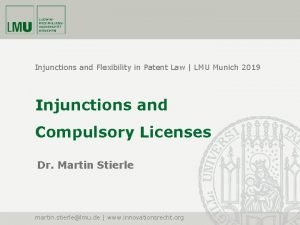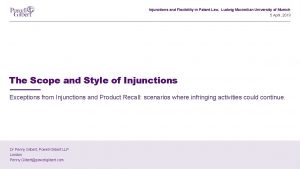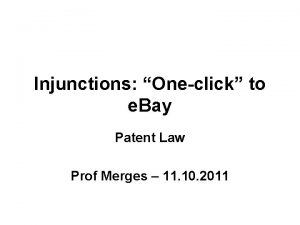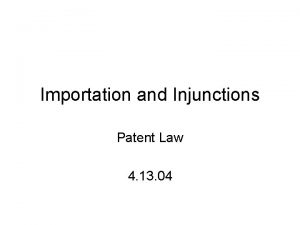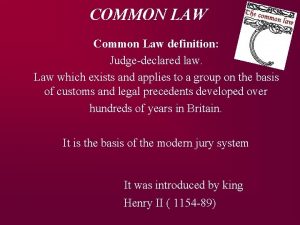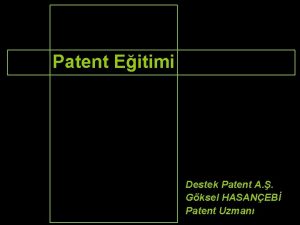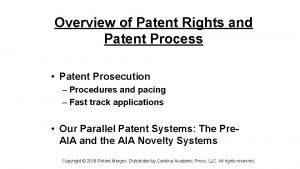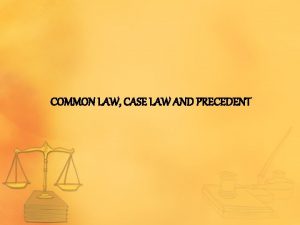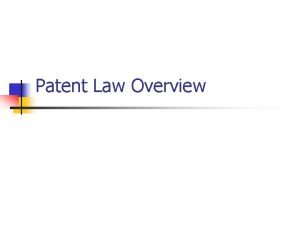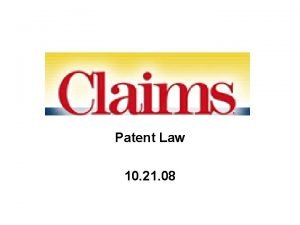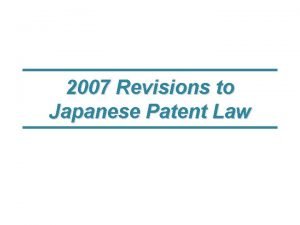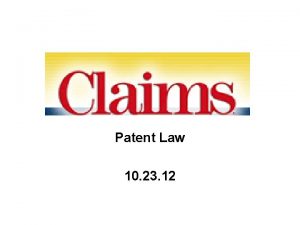Patent Injunctions in the Common Law World The











![American Cyanamid v Ethicon [1975] AC 396 (HL) • No special test for patents American Cyanamid v Ethicon [1975] AC 396 (HL) • No special test for patents](https://slidetodoc.com/presentation_image_h/b8ce764c54480238a22153ed39a95588/image-12.jpg)








- Slides: 20

Patent Injunctions in the Common Law World: The Shift in Focus from Interim to Final Relief Lionel Bently (University of Cambridge)

e. Bay v Merc. Exchange, 547 US 388 (2006) • Supreme Court “reaffirmed” that grant of injunction is discretionary, and four factor approach: • • (i) P suffered irreparable injury (ii) remedies at law are inadequate (iii) considering the balance of hardship, remedy warranted (iv) public interest not disserved by permanent injunction

e. Bay v Merc. Exhange, 547 US 388 (2006) • Therefore District Court wrong to refuse • Court of Appeal wrong to grant automatically • But Supreme Court divided over lesson of history • Roberts CJ (Scalia J, Ginsburg J): injunctions in vast majority of patent cases because patent gives right to exclude. History a guide. • Kennedy J (Stevens J, Souter J and Breyer J): past practice needs to be viewed in context. In many instances nature of patent and its economic function is “quite unlike earlier cases”.

Observations on e. Bay from an English legal perspective • Interesting that a final injunction case • In English legal history all the debate has been over the best approach to interim injunctions (in particular, how far should concern merits, how far justice – balance of convenience) • Final injunctions have been relatively uncontroversial. Although there is some flexibility the normal starting point has been that a finding of patent infringement leads to an injunction. The exceptions are rather limited.

English Law: Interim Injunctions • A complicated history • The division of the courts between Law (Kings Bench, Common Pleas, Exchequer) and Equity (Chancery, Exchequer) • Patent infringement and validity a matter for common law. Trials before juries. • However, typically, litigation started in Chancery. Question arose: whether to grant interim injunction pending final resolution of the legal issues

Interim Injunctions Before the Judicature Acts • Bill for injunction in Chancery, with affidavits • If D’s answer contested patent, would require trial at law (‘Nisi Prius’). Then confirmation by Court of Error. • Should injunction be granted or maintained in mean time? • In this context, before Judicature Acts 1873, court had discretion (i) could grant injunction (ii) could stay, pending decision of court of law, requiring D to keep accounts (iii) could refuse. Bacon v Jones (1839) (Cottenham LC): “Which of these several courses ought to be taken must depend entirely upon the discretion of the Court, according to the case made”.

English Law: Interim Injunctions (ctd) • In making decision in early 19 th century, a key factor was how long the patent had been left unchallenged (while being used). Court drew inference of validity from long use • Harmer v Plane (1807) Eldon LC: if “reasonably long and undisputed possession under color of the patent” – usually grant; though may be a case where “such strong doubt” that injunction dissolved • Hill v Thompson (1817) Eldon LC “an exclusive possession of some durations” (grant); cf. “but of yesterday” will send patentee to court of law while requiring D to keep an account of sales; and might not revive injunction following verdict where evidently a legal ground for a new trial. • But from 1840 s, courts became even more cautious, focusing on “balance of inconvenience”. Soon after, undertakings by plaintiff to compensate defendant for losses became normal part of process.

‘Balance of Convenience’ and ‘Undertakings by Plaintiff • Bridson v. Mc. Alpine (1845) 8 Beav. 229 , 230 Lord Langdale MR: “There are many cases in which it is not clear either that the patent is legally valid, or that it has been infringed. It depends on the degree of doubt which exists on these questions, whether the Court will grant the interim injunction. In such cases it will cautiously consider the degree of convenience and inconvenience to the parties by granting or not granting the injunction. ” • Davenport v Jepson (1862)

English Law – Interim Injunctions (ctd) • Following Judicature Acts, Courts were merged. • Whether to grant an injunction became more focused on whether a prima facie case and balance of convenience.

Plimpton v Spiller (1876) 4 Ch D 286 (CA) • P had been using, and had won action against another Defendant. Jessel MR awarded interim injunction, the P undertaking to abide by such order (if any) as to damages as the Court may think fit to make if he should ultimately turn out to be in the wrong. CA divided 2 -1 in favour of affirming. All treated in terms of balance of inconvenience • James LJ: “really what the Court has to do…[is]…. to keep things in statu quo …. until the final decision of the question” • Brett JA: key factor was that D was new in trade • Baggallay LJ, dissent, focused on size of loss to D if injunction granted, or to P if refused. (Ostensibly refused to focus on

Challender v Royle (1887) 36 Ch. D. 425 • It is very true that in all cases of interlocutory injunction the Court does consider and ought to consider the balance of convenience and inconvenience in granting or refusing the injunction. But there is another very material question to be considered, has the Plaintiff made out a primâ facie case? That is to say if the evidence remains as it is, is it probable that at the hearing of the action he will get a decree in his favour? …unless the Court is so satisfied it would be wrong to grant an injunction, merely on the ground that it cannot do the Defendant any harm. Injunctions ought to be granted only on a case made out entitling the Plaintiff to that particular remedy.
![American Cyanamid v Ethicon 1975 AC 396 HL No special test for patents American Cyanamid v Ethicon [1975] AC 396 (HL) • No special test for patents](https://slidetodoc.com/presentation_image_h/b8ce764c54480238a22153ed39a95588/image-12.jpg)
American Cyanamid v Ethicon [1975] AC 396 (HL) • No special test for patents now that they are examined • Threshold is whethere is a serious question to be tried/not frivolous or vexatious • Then consider whether P would be adequately compensated by damages or, if not, whether D would be by the cross-undertaking in damages • Then consider balance of convenience: “It would be unwise to attempt even to list all the various matters which may need to be taken into consideration in deciding where the balance lies, let alone to suggest the relative weight to be attached to them. These will vary from case to case” • Finally status quo

National Commercial Bank Jamaica Ltd v Olint Corp • The basic principle is that the court should take whichever course seems likely to cause the least irremediable prejudice to one party or the other.

English Law: Final Injunctions – The starting Point • Probably implicit in interim concern over prima facie case was assumption that if validity/infringement established, an injunction would be suitable • Bridson v. Mc. Alpine (1845) 8 Beav. 229 , 230, Lord Langdale MR “Where those two facts [validity and infringement] are established, it is within the power, as it is the duty of the Court, to grant the injunction. ” • Davenport v Jepson (1862)

English Law: Final Injunctions – The starting Point • Coflexip SA v Stolt Comex Seaway MS Ltd, [2001] RPC 182, 186 “Where a patentee has conclusively established the validity of his patent and that it had been infringed, as a general rule an injunction will be granted. However that will not happen as a matter of course as an injunction is a discretionary remedy. It is for that reason there have been cases where injunctions have been refused, for example, where the defendant satisfied the court that further infringement was not likely. ” • Proctor v Bayley (1889) 42 Ch 390 (injunction refused because no likelihood of D infringing again)

English Law – Final Injunctions – The Shelfer Exception Shelfer v City of London Lighting Co Ltd [1895] 1 Ch 287, 322 -323, AL Smith LJ: "(1) If the injury to the plaintiff's legal rights is small, (2) And is one which is capable of being estimated in money, (3) And is one which can be adequately compensated by a small money payment, (4) And the case is one in which it would be oppressive to the defendant to grant an injunction: – then damages in substitution for an injunction may be given“ Oppressiveness is NOT balance of convenience: Navitaire Inc v Easy. Jet Airline Co Ltd (No. 2) [2005] EWHC 282 (Ch), [2006] RPC 4, [104] (Pumfrey J).

Questions Prompted by e. Bay • Why the sudden concern with final injunctions? • Has the Supreme Court illegitimately imported “the balance of hardship” into final relief?

Why The Sudden concern with Final Injunctions? • Procedural improvements mean that interim injunction applications rarely arise • Trials are brought on more quickly; issues are narrowed; no examination in chief; hearing concluded. • Interim injunction cases now limited e. g. to cases of imminent marketing of ‘generic versions of pharmaceuticals • Of course, some parallel concerns arise in relation to stays where opposition proceedings are pending at EPO (eg Smith & Nephew plc v Conva. Technologies Inc [2015] EWCA Civ 803, [13]; and where there are pending appeals: Novartis AG v Hospira UK Ltd [2013] EWCA Civ 583, [2014] 1 WLR 1264, [41])

The Concern With Final Injunctions • Not just patents. UKSC in Lawrence v Fen Tigers Ltd [2014] UKSC 13, [2014] AC 822 embraced liberalisation from strictness of Shelfer. “[119] … an almost mechanical application of A L Smith LJ's four tests, and (ii) an approach which involves damages being awarded only in "very exceptional circumstances", are each simply wrong in principle …. [120] The court's power to award damages in lieu of an injunction involves a classic exercise of discretion, which should not, as a matter of principle, be fettered… And, as a matter of practical fairness, each case is likely to be so fact-sensitive that any firm guidance is likely to do more harm than good. … “

Flexibility in Interim and Final Injunctions • Interim Injunctions: on its face, the balance of convenience was all about “justice” – minimizing harm until the rights and wrongs can be resolved; the prima facie case implied if resolved for plaintiff, an injunction would follow. As Lord Hoffmann said “The basic principle is that the court should take whichever course seems likely to cause the least irremediable prejudice to one party or the other. ” • Importation of balance of hardship into final injunction cases (in e. Bay), and greater flexibility in Fen Tigers (as well as under Enforcement Directive) may cause us to revisit the case-law • How far were rulings in interim injunction cases ALSO about public policy favouring giving a defendant freedom to establish themselves in competition? • Cf. Roussel-Uclaf v GD Searle & Co Ltd, [1977] FSR 125, 131 (refusing interim application in relation to drug for treating cardiac disease. on the normal basis, but indicating that he would have denied relief because the drug was a life-saving one. )
 Transactional analysis 101
Transactional analysis 101 Hot topics in patent law
Hot topics in patent law Difference between common law and statute law
Difference between common law and statute law Common law australia
Common law australia Common law and civil law
Common law and civil law Common law and civil law
Common law and civil law International contracts
International contracts Newton's first law and second law and third law
Newton's first law and second law and third law Si unit of newton's first law
Si unit of newton's first law V=k/p
V=k/p Boyle's law charles law avogadro's law
Boyle's law charles law avogadro's law Greatest common factor of 18 and 27
Greatest common factor of 18 and 27 Common anode and common cathode
Common anode and common cathode Lowest common multiple of 80 and 60
Lowest common multiple of 80 and 60 What are the factors for 54
What are the factors for 54 Common factors of 12 and 42
Common factors of 12 and 42 Highest common factors and lowest common multiples
Highest common factors and lowest common multiples Patent electronic business center
Patent electronic business center National association of patent practitioners
National association of patent practitioners English royal patent of 1662
English royal patent of 1662 Tübitak patent desteği
Tübitak patent desteği
